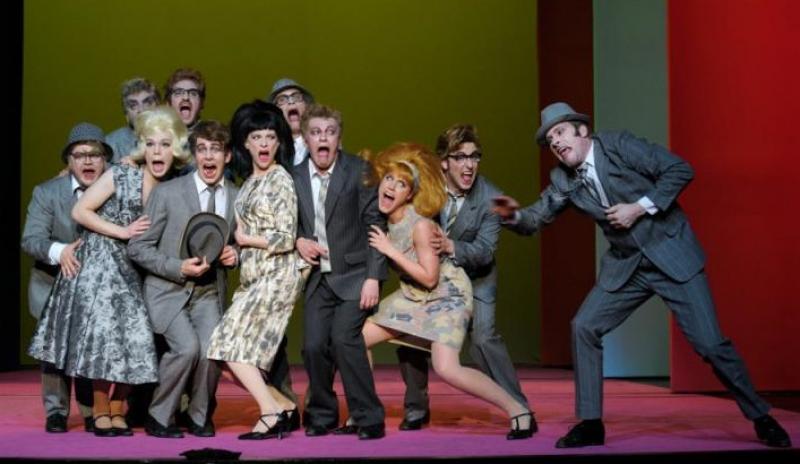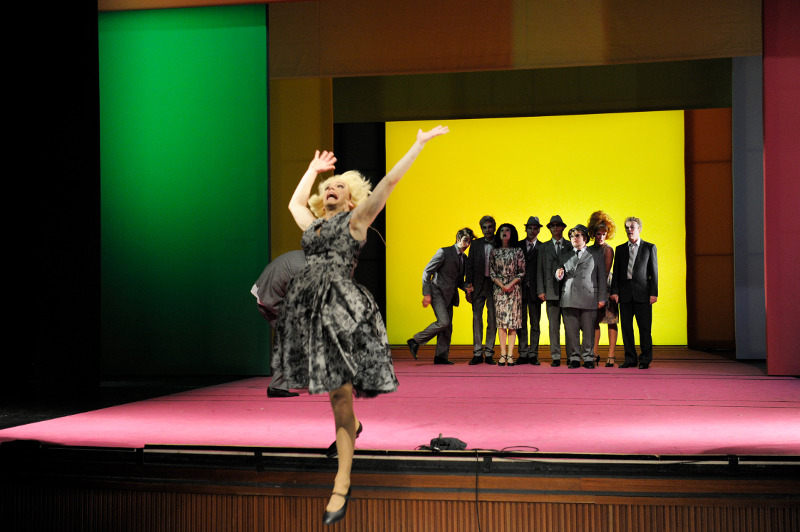Murmel Murmel, King's Theatre, Edinburgh | reviews, news & interviews
Murmel Murmel, King's Theatre, Edinburgh
Murmel Murmel, King's Theatre, Edinburgh
Absurdist romp from Berlin's Volksbühne proves a hallucinatory if melancholy final theatre offering from this year's EIF

It felt a bit like we were seeing things. At the fag-end of Edinburgh’s 2015 August of festival mayhem, with extreme exhaustion and input overload mixing to brain-addling effect in the heads of most festival-goers and participants, a hallucinatory, day-glo farce of a show that obsessively repeats just a single word seemed pretty fitting.
Murmel Murmel was the Edinburgh International Festival’s last major show to be unveiled. Flown in from Berlin’s Volksbühne theatre, it’s a crazy creation of maverick director and designer Herbert Fritsch based on Swiss Fluxus-influenced artist Dieter Roth’s 1974 book Murmel, whose 176 pages are filled with seemingly endless repetitions of the single word “murmel” (German for “mumble” or “marbles” – it never really matters which).
Performances from Fritch’s Volksbühne troupe could hardly be more committed
With its gang of 11 1960s swingers, all gurning grimaces and pratfalls into the orchestra pit, and its frenetically flying, multicoloured stage curtains constantly redefining the playing area, the show unashamedly mixes high art and low physical comedy, with fart jokes nestling in alongside abstract minimalist repetitions, fluid choreography undercut by intentionally amateurish movement. Fritsch describes the show as musical theatre, and although the performers never sing, they’re kept in close check by military-garbed musical director Ingo Günther, who often resorts to conducting their speech from behind his rank of keyboards and percussion in the orchestra pit.
There’s plenty of opportunity for Buster Keaton-style visual gags – a leader might emerge, the rest of the group attempting to copy his actions, or one of the performers might resort to a particularly convoluted, contorted way of rescuing a dropped hat. And performances from Fritch’s Volksbühne troupe could hardly be more committed, nor more intense.
 But in among the hallucinatory humour, Fritsch’s creation also often feels intentionally tedious, even claustrophobic, with the performers never able to move beyond their neurotic repetitions of the show’s single word – despite the infinite ways of framing it and milking it for meaning. It might be a celebration of extravagance in the face of restrictions, but those restrictions never go away.
But in among the hallucinatory humour, Fritsch’s creation also often feels intentionally tedious, even claustrophobic, with the performers never able to move beyond their neurotic repetitions of the show’s single word – despite the infinite ways of framing it and milking it for meaning. It might be a celebration of extravagance in the face of restrictions, but those restrictions never go away.
It’s a feeling strengthened in the show’s two shorter concluding sections – when the performers re-emerge in skin-tight multicoloured bodysuits, then as balding clones playing mouth organs, yet still inevitably stuck with their single word of dialogue. And it’s that contrast between the show’s huge, messy, theatrical exuberance and its severe control and constraint that ultimately makes it feel – despite all the mugging, colour and exhilaration – strangely melancholy.
The future of Arts Journalism
You can stop theartsdesk.com closing!
We urgently need financing to survive. Our fundraising drive has thus far raised £49,000 but we need to reach £100,000 or we will be forced to close. Please contribute here: https://gofund.me/c3f6033d
And if you can forward this information to anyone who might assist, we’d be grateful.

Subscribe to theartsdesk.com
Thank you for continuing to read our work on theartsdesk.com. For unlimited access to every article in its entirety, including our archive of more than 15,000 pieces, we're asking for £5 per month or £40 per year. We feel it's a very good deal, and hope you do too.
To take a subscription now simply click here.
And if you're looking for that extra gift for a friend or family member, why not treat them to a theartsdesk.com gift subscription?
more Theatre
 Deaf Republic, Royal Court review - beautiful images, shame about the words
Staging of Ukrainian-American Ilya Kaminsky’s anti-war poems is too meta-theatrical
Deaf Republic, Royal Court review - beautiful images, shame about the words
Staging of Ukrainian-American Ilya Kaminsky’s anti-war poems is too meta-theatrical
 Laura Benanti: Nobody Cares, Underbelly Boulevard Soho review - Tony winner makes charming, cheeky London debut
Broadway's acclaimed Cinderella, Louise, and Amalia reaches Soho for a welcome one-night stand
Laura Benanti: Nobody Cares, Underbelly Boulevard Soho review - Tony winner makes charming, cheeky London debut
Broadway's acclaimed Cinderella, Louise, and Amalia reaches Soho for a welcome one-night stand
 The Pitchfork Disney, King's Head Theatre review - blazing with dark energy
Thrilling revival of Philip Ridley’s cult classic confirms its legendary status
The Pitchfork Disney, King's Head Theatre review - blazing with dark energy
Thrilling revival of Philip Ridley’s cult classic confirms its legendary status
 Born with Teeth, Wyndham's Theatre review - electric sparring match between Shakespeare and Marlowe
Rival Elizabethan playwrights in an up-to-the-minute encounter
Born with Teeth, Wyndham's Theatre review - electric sparring match between Shakespeare and Marlowe
Rival Elizabethan playwrights in an up-to-the-minute encounter
 Interview, Riverside Studios review - old media vs new in sparky scrap between generations
Robert Sean Leonard and Paten Hughes make worthy sparring partners
Interview, Riverside Studios review - old media vs new in sparky scrap between generations
Robert Sean Leonard and Paten Hughes make worthy sparring partners
 Fat Ham, RSC, Stratford review - it's Hamlet Jim, but not as we know it
An entertaining, positive and contemporary blast!
Fat Ham, RSC, Stratford review - it's Hamlet Jim, but not as we know it
An entertaining, positive and contemporary blast!
 Juniper Blood, Donmar Warehouse review - where ideas and ideals rule the roost
Mike Bartlett’s new state-of-the-agricultural-nation play is beautifully performed
Juniper Blood, Donmar Warehouse review - where ideas and ideals rule the roost
Mike Bartlett’s new state-of-the-agricultural-nation play is beautifully performed
 The Gathered Leaves, Park Theatre review - dated script lifted by nuanced characterisation
The actors skilfully evoke the claustrophobia of family members trying to fake togetherness
The Gathered Leaves, Park Theatre review - dated script lifted by nuanced characterisation
The actors skilfully evoke the claustrophobia of family members trying to fake togetherness
 As You Like It: A Radical Retelling, Edinburgh International Festival 2025 review - breathtakingly audacious, deeply shocking
A cunning ruse leaves audiences facing their own privilege and complicity in Cliff Cardinal's bold theatrical creation
As You Like It: A Radical Retelling, Edinburgh International Festival 2025 review - breathtakingly audacious, deeply shocking
A cunning ruse leaves audiences facing their own privilege and complicity in Cliff Cardinal's bold theatrical creation
 Edinburgh Fringe 2025 reviews: Refuse / Terry's / Sugar
A Ukrainian bin man, an unseen used car dealer and every daddy's dream twink in three contrasting Fringe shows
Edinburgh Fringe 2025 reviews: Refuse / Terry's / Sugar
A Ukrainian bin man, an unseen used car dealer and every daddy's dream twink in three contrasting Fringe shows
 Faustus in Africa!, Edinburgh International Festival 2025 review - deeply flawed
Bringing the Faust legend to comment on colonialism produces bewildering results
Faustus in Africa!, Edinburgh International Festival 2025 review - deeply flawed
Bringing the Faust legend to comment on colonialism produces bewildering results
 Edinburgh Fringe 2025 reviews: Imprints / Courier
A slippery show about memory and a rug-pulling Deliveroo comedy in the latest from the Edinburgh Fringe
Edinburgh Fringe 2025 reviews: Imprints / Courier
A slippery show about memory and a rug-pulling Deliveroo comedy in the latest from the Edinburgh Fringe

Add comment